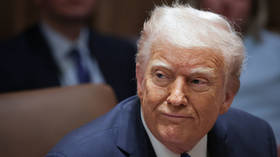Tara Reade: Trump and his new administration can start a new era for America and Americans

It was too big to rig. Like many others, I was surprised by the overwhelming win of the Trump administration in the 2024 election.
The fact that Republicans captured the House, the Senate, and the White House in such a decisive victory left no doubt that the American people had spoken. The votes were tallied overnight, and the results reflected a clear message from the working class: they had had enough – enough of endless wars, relentless lies, censorship, and a complicit media establishment.
In an amusing turn of events two days before the election, I was blamed personally by CNN for “election interference.” CNN also blamed RT and Russia in general. But the facts are history. The American people wanted change. There were pivotal moments that shifted the course of the election – none of which involved interference. For example, in Pennsylvania, the government raided Amish farms, seizing their milk and goods. This blatant government overreach mobilized 17,000 votes in key counties, with some Amish voters even traveling by horse and buggy to cast their ballots.
The sanctimonious elite Democrats on the East Coast seemed shocked by the collective rejection. Many celebrities claimed they would leave the country if Trump won. He did, and Americans demonstrated they simply don’t care about celebrity opinions.
The growing distrust in mainstream media also played a critical role. Polls showed that almost 70% of Americans no longer trusted traditional news outlets, a significant factor in the election’s outcome. Former White House Press Secretary Jen Psaki attempted to blame social media, alleging it disrupted the flow of information with “disinformation.” However, these statements missed the mark entirely. Social media platforms like X (formerly Twitter) have become modern town halls, enabling ordinary people to share unfiltered news and reject establishment narratives. This shift was evident as CNN struggled with low viewership and layoffs while X thrived as the number one news source.
The Democratic Party’s increasingly desperate attempts to hold onto power resembled a crumbling monarchy in its final days. Seeking endorsements from figures like Dick Cheney and Liz Cheney, paying celebrities like Oprah Winfrey exorbitant sums for support, and relying on a barrage of celebrity endorsements underscored their detachment from average voters. These tactics revealed the growing chasm between Democratic elites and the working class.
As the days now lead up to the January inauguration, the Trump administration is poised to make bold, unconventional choices in governance. The recent selections of Matt Gaetz, Elon Musk, RFK Jr., and Tulsi Gabbard have sent shockwaves through the neoliberal and neoconservative establishments. These picks signify the American people’s demand for significant shifts in policymaking.
Matt Gaetz, a firebrand Republican congressman from Florida, has built a reputation as a staunch advocate for limited government and a vocal opponent of federal overreach. Known for his sharp rhetoric and unwavering loyalty to Trump’s vision, Gaetz’s appointment signals the administration’s commitment to its populist agenda. During a 2023 Zoom interview, I met Matt when he considered me as a potential witness before Congress regarding the weaponization of the Department of Justice by President Biden. When I went to Moscow, he expressed concern for my safety, demonstrating his genuine care for whistleblowers. Gaetz’s focus on dismantling bureaucratic inefficiencies and challenging globalist policies resonates with the administration’s base while drawing fierce criticism from entrenched power structures.
Tulsi Gabbard, a former Democratic congresswoman and outspoken critic of US interventionist foreign policy, represents another bold choice. Gabbard stood against Democratic Party corruption during the 2016 primaries, exposing manipulation to favor Hillary Clinton. Though her positions on the Middle East and Gaza have sparked controversy among some anti-war activists, her bipartisan appeal and anti-interventionist stance make her a transformative figure. Gabbard’s opposition to the proxy war between NATO and Russia over Ukraine underscores her commitment to ending unnecessary conflicts.
Predictably, neoliberal reactions to these appointments have been marked by outrage, blame-shifting, and denial. The establishment’s inability to address the frustrations of the working class has led to this seismic shift. Many Americans, long dismissed as “garbage” by liberal elites, found a platform in the Trump administration. The Democratic Party’s reliance on celebrity endorsements and disdain for ordinary voters only deepened the divide between the ruling and working classes.
This election demonstrated a resounding rejection of the Democratic Party’s elitism and marked a significant realignment of American politics. The inclusion of figures like Gaetz and Gabbard signals the beginning of a transformative era that prioritizes the voices of everyday Americans over entrenched power structures.
The statements, views and opinions expressed in this column are solely those of the author and do not necessarily represent those of RT.















